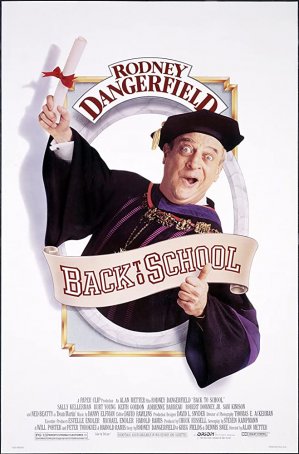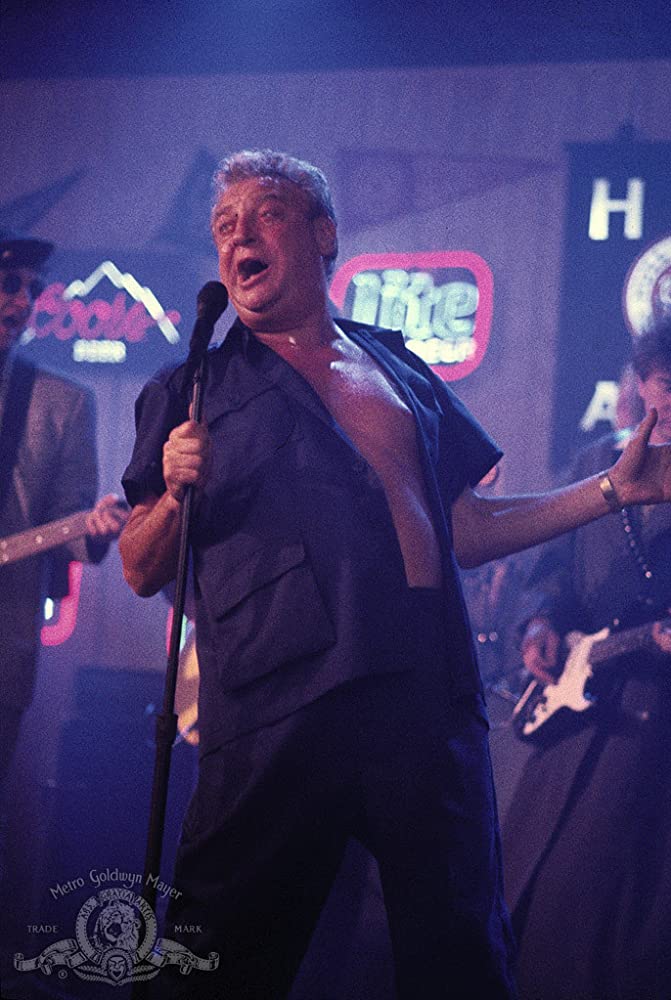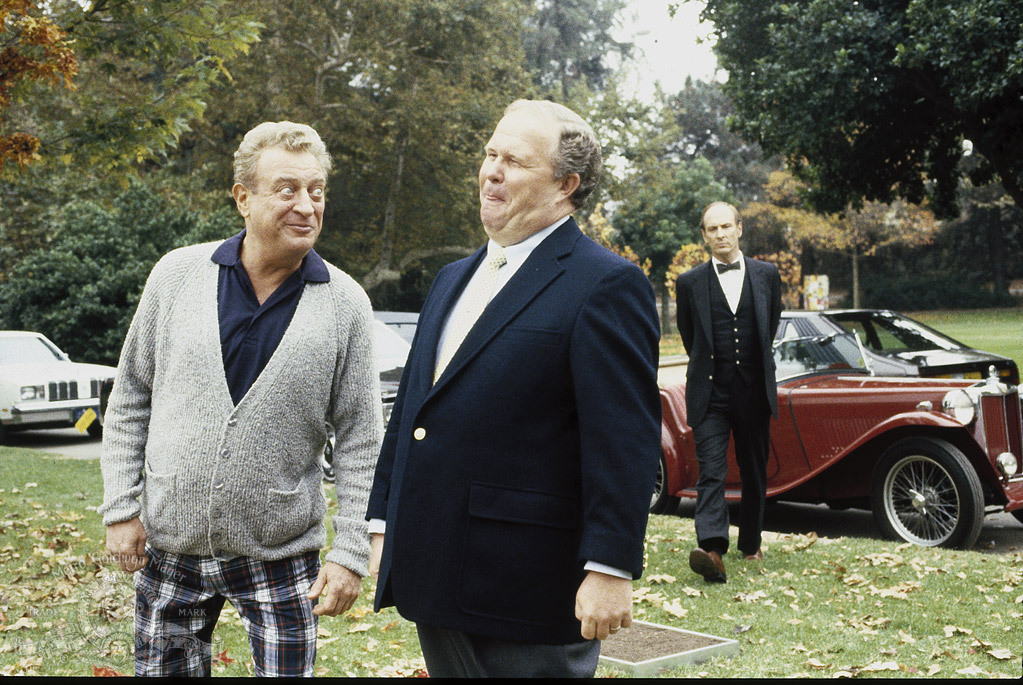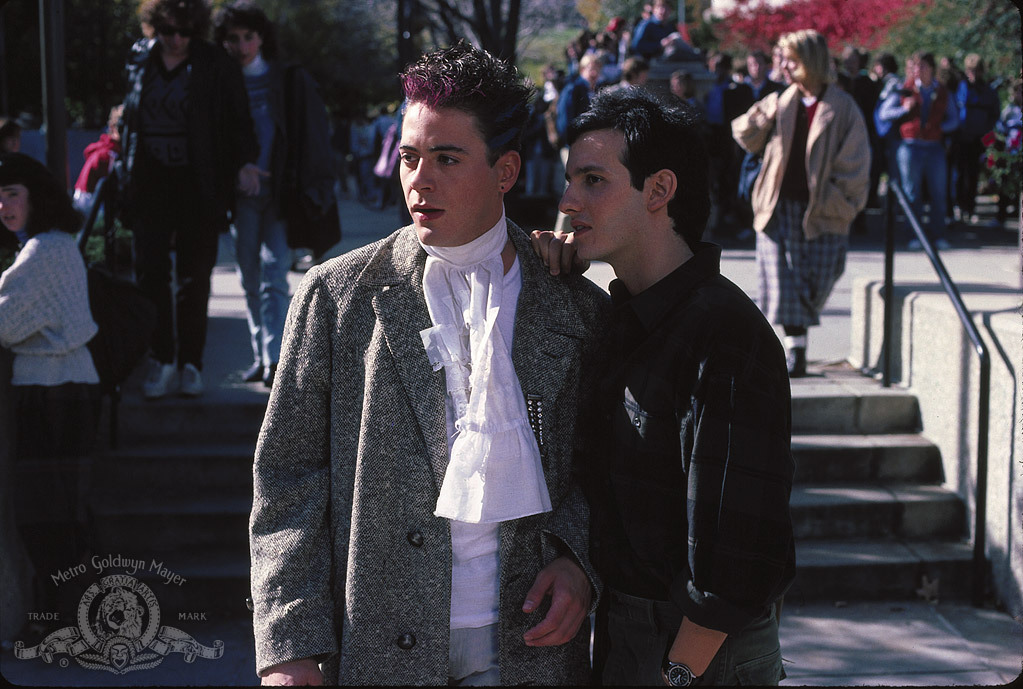Back to School (United States, 1986)
August 09, 2020
For Rodney Dangerfield, the stand-up comedian whose
catchphrase was “I don’t get no respect,” Back to School provided an
opportunity to get more than his share of praise and adulation. The
crowd-pleasing comedy grossed $91M, making it the sixth-highest earner of 1986
and by far the biggest money-maker of Dangerfield’s career. (None of his other
films made as much as half of that.) The movie is pure Dangerfield – a
thinly-sketched narrative providing a clothesline onto which the comedian could
pin a long string of gags and one-liners.
Story-wise, Back to School feels like what it is: a
product of the ‘80s. Most comedies of that era adhered to a belief that
elements of pathos would somehow elevate the proceedings. The movie finds its
groove when Dangerfield is improvising and sharing the kind of humor that made
him a household name (via appearances on The Tonight Show, where he was
a regular during the 1970s and 1980s) but it enters cringeworthy territory when
trying to show that it has a “heart” in addition to a funny bone. Although it’s
possible for a movie to have both, doing so requires a level of sophistication
never achieved by Back to School. Director Alan Metter (Girls Just
Want to Have Fun, Police Academy: Mission to Moscow) isn’t on the level of
a Cameron Crowe or Judd Apatow (as examples).
 Thornton Melon (Rodney Dangerfield) has grown rich through
the ownership and operation of a chain of “Tall and Fat” clothing stores
despite never having had a college education. When his marriage to his second
wife Vanessa (Adrienne Barbeau) falls apart, Thornton decides to pay a visit to
his son, Jason (Keith Gordon), who has recently begun life as a college undergraduate.
As a show of support when Jason confesses a desire to drop out, Thornton enrolls
so father and son can experience higher education together. A generous gift to
the school allows Dean Martin (Ned Beatty) to bypass the stringent enrollment
requirements, giving Thornton a place in the freshman class. This development
is met with mixed feelings by Jason and his anti-social best friend, Derek
(Robert Downey Jr.).
Thornton Melon (Rodney Dangerfield) has grown rich through
the ownership and operation of a chain of “Tall and Fat” clothing stores
despite never having had a college education. When his marriage to his second
wife Vanessa (Adrienne Barbeau) falls apart, Thornton decides to pay a visit to
his son, Jason (Keith Gordon), who has recently begun life as a college undergraduate.
As a show of support when Jason confesses a desire to drop out, Thornton enrolls
so father and son can experience higher education together. A generous gift to
the school allows Dean Martin (Ned Beatty) to bypass the stringent enrollment
requirements, giving Thornton a place in the freshman class. This development
is met with mixed feelings by Jason and his anti-social best friend, Derek
(Robert Downey Jr.).
Thornton’s arrival is greeted with contempt by business
professor Philip Barbay (Paxton Whitehead), who despises the means by which his
newest student has gained admittance to the college. Others, like English
teacher Diane Turner (Sally Kellerman) and diving coach Turnbull (M. Emmet
Walsh), are more open to the idea of a sixty-something year-old freshman.
Thornton’s attempts to woo Diane fuel Philip’s anger (he’s currently dating
her) and make the professor determined to see the newcomer expelled. Meanwhile,
Thornton’s appearance on campus helps Jason develop enough self-confidence to
talk to his crush, Valerie (Terry Ferrell), and push back against the bullying
captain of the diving team, Chas (William Zabka).
 Although Dangerfield never once says, “I don’t get no
respect,” he has plenty of other rejoinders that remain amusing (if a little
corny) years later. A highlight occurs when Thornton gives a pitch in a TV
commercial for his stores. The litany of fat jokes goes something like this:
“When you go jogging, do you leave pot-holes? When you make love, do you have
to give directions? At the zoo, do the elephants throw YOU peanuts? Do you look
at a menu and say 'OK'?” Terribly politically incorrect, to be sure, but funny.
This is Dangerfield being Dangerfield – self-deprecating and utterly
unconcerned about offending the viewer. Although some of his comedy is
off-color, none of it is especially profane. Although not as squeaky clean as
Bob Hope, Dangerfield didn’t go as far as George Carlin or Don Rickles. By
today’s standards, he would be considered tame.
Although Dangerfield never once says, “I don’t get no
respect,” he has plenty of other rejoinders that remain amusing (if a little
corny) years later. A highlight occurs when Thornton gives a pitch in a TV
commercial for his stores. The litany of fat jokes goes something like this:
“When you go jogging, do you leave pot-holes? When you make love, do you have
to give directions? At the zoo, do the elephants throw YOU peanuts? Do you look
at a menu and say 'OK'?” Terribly politically incorrect, to be sure, but funny.
This is Dangerfield being Dangerfield – self-deprecating and utterly
unconcerned about offending the viewer. Although some of his comedy is
off-color, none of it is especially profane. Although not as squeaky clean as
Bob Hope, Dangerfield didn’t go as far as George Carlin or Don Rickles. By
today’s standards, he would be considered tame.
With Dangerfield sucking up all the oxygen in the room,
there isn’t much chance for anyone else to shine, so it’s no surprise that the
cast lacks many recognizable names. Sally Kellerman brings a little saucy sex
appeal, although most viewers at the time may have still been remembering Hot
Lips Houlihan while watching her. Ned Beatty doesn’t have much to do; his
appearance as Dean Martin (the name is an in-joke – Dangerfield often appeared
on Martin’s TV show) is little more than a cameo. Robert Downey Jr., during the
pre-Less Than Zero portion of his career (in other words, before critics
started taking him seriously), has a supporting role.
 The movie represents a mix of the clever and the sappy. On
the one hand, there’s Thornton having an entire staff doing his homework (including
Kurt Vonnegut writing a paper on Kurt Vonnegut), renovating his dorm room (into
a luxury apartment), and taking notes for him in class. On the other hand,
there’s the cheesy happy ending that wraps up everything in too-pleasing
fashion. (Ah, but that’s the way it was with almost all ‘80s comedies…) There’s
little or no chemistry evident between Dangerfield and Kellerman or Dangerfield
and Keith Gordon. The father/son relationship never gels. The two seem like
strangers.
The movie represents a mix of the clever and the sappy. On
the one hand, there’s Thornton having an entire staff doing his homework (including
Kurt Vonnegut writing a paper on Kurt Vonnegut), renovating his dorm room (into
a luxury apartment), and taking notes for him in class. On the other hand,
there’s the cheesy happy ending that wraps up everything in too-pleasing
fashion. (Ah, but that’s the way it was with almost all ‘80s comedies…) There’s
little or no chemistry evident between Dangerfield and Kellerman or Dangerfield
and Keith Gordon. The father/son relationship never gels. The two seem like
strangers.
It's hard to explain why Back to School achieved the
level of popularity it did. Some of it was because of Dangerfield, who was
riding the pop culture wave generated by his appearance in a series of Miller
Lite Beer commercials. Some was a savvy marketing campaign. And some was
positive word of mouth. Although the film is enjoyable in a modern context,
it’s not as funny or endearing as it was during its theatrical run, when the
topicality of some of the humor hadn’t dissipated and Dangerfield’s brand of
humor was greeted as warmly as his offbeat, larger-than-life personality. Back
to School is a representative reflection of ‘80s kitsch but, as flavored by
Dangerfield’s salty personality, its laughs are thankfully more often intentional
than unintentional.
Back to School (United States, 1986)
Cast: Rodney Dangerfield, William Zabka, Adrienne Barbeau, M. Emmet Walsh, Terry Farrell, Paxton Whitehead, Robert Downey Jr., Keith Gordon, Burt Young, Sally Kellerman, Ned Beatty
Home Release Date: 2020-08-09
Screenplay: Steven Kampmann & Will Porter and Peter Torokvei & Harold Ramis, based on a story by Rodney Dangerfield & Greg Fields & Dennis Snee
Cinematography: Thomas E. Ackerman
Music: Danny Elfman
U.S. Distributor: Orion Pictures
U.S. Release Date: 1986-06-13
MPAA Rating: "PG-13" (Profanity, Sexual Content, Brief Nudity)
Genre: Comedy
Subtitles: none
Theatrical Aspect Ratio: 1.85:1
- (There are no more better movies of Rodney Dangerfield)
- (There are no more worst movies of Rodney Dangerfield)
- Karate Kid, The (1984)
- (There are no more better movies of William Zabka)
- (There are no more worst movies of William Zabka)
- (There are no more better movies of Adrienne Barbeau)
- Escape from New York (1969)
- (There are no more worst movies of Adrienne Barbeau)

Comments